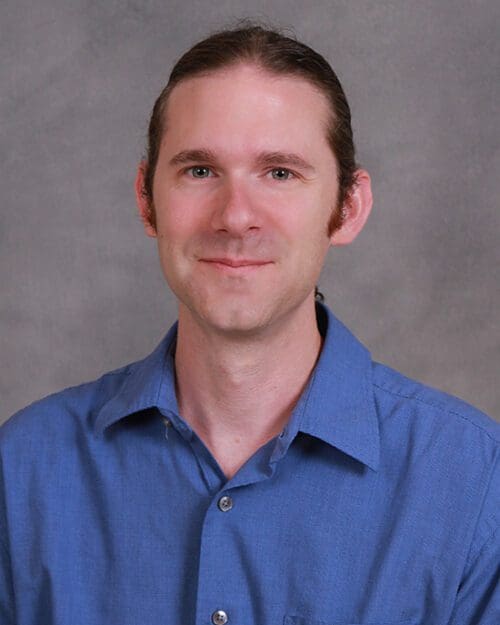Lionhearted Leaders: Robert Hallock

PNW’s Lionhearted Leaders are faculty recognized for their exceptional work inside and outside the classroom.
Meet Robert Hallock, associate professor of psychology and a Lionhearted Leader in the Department of Psychology.
How will your research benefit PNW?
My research interests are varied, and that allows me to get a number of students involved in research. I research animal conditioning, taste and smell perception, and also undergraduate drug use, and these are all things I studied extensively and published in before coming to PNW.
I’m also always happy to hear from students about what they want to research. That allows us to develop a testable hypothesis and methodology to answer their question. After that, we execute the study and analyze the results and see what we’ve got.
Undergraduate research allows students to apply the information from their foundational academic courses (Research Methods and Statistics) with a content course that often focuses on a specific discipline they’ve come to love and explore it at a deeper level. Courses like Brain and Behavior, Learning and Memory, Abnormal Psychology, etc. can each be readily linked to real world problems, and there is no shortage of research questions in the discipline.
The research process allows them to build real-life skills like research design, data analysis, critical thinking skills, and scientific presentation skills. I have gotten peer- reviewed publications with around 25-30 students, and know these experiences continue to help them long after they leave PNW.
What motivates you to do your best?
I went to a community college right after high school, partly for the cost-savings, but also partly because I had no clue what I wanted to do. In my second year, I took a psychology course where everyone had to participate in a biofeedback lab throughout the semester.
The lab was a small room with old equipment, including basic EEGs to measure brain waves, some EMGs to measure muscle tension, and a few that measured the pulse and skin temperature. Each student simply had to spend nine hours in the lab during the semester to work on various relaxation techniques, and bring physiological function (brain waves, pulse, etc.) under conscious control, something we call ‘biofeedback’ in psychology.
I thought that merely participating in this lab was the coolest thing in the world, and then there was an opportunity to be one of the research assistants in the lab. I got the position and then got to actually hook people up to all the equipment for the semester.
That singular experience provided me with direction, and I’ve been studying the brain ever since. I went on to get my BA in Psychology, MA in Psychology, and finally a PhD in Behavioral Neuroscience. And still, after all these years, I find the brain fascinating and I still learn new things about it all the time. That one experience in the biofeedback lab changed the course of my life and gave me direction, and I think every student should have an opportunity to experience something that allows them to find their passion.
What do you like to do outside of work?
I enjoy traveling, hiking, camping, gardening, and I forage wild plants and mushrooms for nine months out of the year. That’s a long list of outdoor activities, but it all helps me connect to nature in a stressful world.
Indiana might not seem like the ideal place for an outdoor enthusiast, but we are very fortunate to live close to the Indiana Dunes State Park, the Indiana Dunes National Park, as well as numerous county parks and local Shirley Heinz Nature Preserves. In total, there are 24 state parks scattered throughout Indiana! I’ve been to 19 of them, and add a new one every year.
I am fortunate that my daughter loves doing these things too, and we are both volunteers at the Indiana Dunes State Park where we help with the monthly full moon hikes and other programs. I also run a mushroom walk in the spring and summer.
We also volunteer for the Indiana Audubon Society. My daughter and I do things like help with the registration table at the Indiana Dunes Birding Festival every spring, and then help capture, band, and release Saw-whet Owls in the fall.